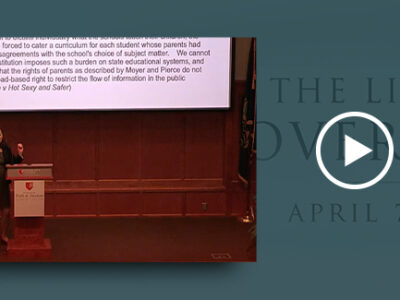Editor’s Note: The “V&V Q&A” is an e-publication from the Center for Vision & Values at Grove City College. Each issue will present an interview with an intriguing thinker or opinion-maker that we hope will prove illuminating to readers everywhere. In this first installment of a special three-part edition of the “V&V Q&A,” the Center for Vision & Values was granted an exclusive interview with acclaimed commentator and best-selling author Dinesh D’Souza regarding his newly released book, What’s So Great About Christianity. D’Souza spoke to the Center for Vision & Values’ Executive Director Dr. Paul Kengor.
Dr. Paul Kengor: Dinesh, I can’t help but begin by tossing you a big softball: I’m impressed by the endorsements for your new book. This is quite an eclectic bunch: Francis Collins of the Human Genome Institute, academic Stanley Fish, the Rev. Robert Schuller, Oxford’s Daniel Robinson, historian Paul Johnson and even Michael Shermer, the publisher of Skeptic magazine. Clearly, you’ve done something right. The title of this book, What’s So Great About Christianity, is a natural follow-up to your earlier work, What’s So Great About America, but the theme is really a follow-up to a bunch of recent books by others attacking religious belief generally and the Christian faith in particular. This book is obviously an answer to the polemics by Christopher Hitchens, Richard Dawkins and others. What’s your answer?
Dinesh D’Souza: We’re seeing a surge of atheist confidence and atheist belligerence. The best-selling atheist books like Hitchens’ God Is Not Great and Dawkins’ The God Delusion are one indication of this. Another is the militancy of atheism on many campuses today. In a way, the atheist attacks on God and religion are a bit odd. I don’t believe in unicorns, but I don’t go around writing books about them. I suspect what has given atheists a boost is the Islamic radicalism we’ve seen in the wake of 9/11. The atheists glibly equate Islamic fundamentalism and Christian fundamentalism, and then conclude that religion itself is the problem.
My book What’s So Great About Christianity is consciously written in the C.S. Lewis tradition. Just as Lewis, writing after World War II, dealt with issues specific to his time, such as “How can a just God allow the Holocaust?” so too my book is a response to the intellectual and moral attack on Christianity launched by the new atheists. I take the atheist argument seriously, and meet it on its own ground, which is the ground of reason and skepticism. I want to show Christians and religious believers that theism makes vastly more sense of the world and of our lives than agnosticism or atheism. I also want to persuade genuine seekers that they should take Christianity seriously, and give it real consideration. I don’t expect to convince dogmatic atheists, but I do intend to expose and refute and embarrass them.
Kengor: In a recent interview, Oxford’s Alistair McGrath said that he is somewhat shocked by the lack of new insights in these best-selling books by Hitchens and Dawkins and the like, and how they are actually, in his view, filled with hackneyed, easily refutable arguments served up for years. He said it seems clear—and very surprisingly so—that these authors don’t appear to read the many readily available counter-arguments that quickly refute their assertions. McGrath believes they have constructed very weak cases that any rank-and-file minister worth his salt could dissect paragraph-by-paragraph with little effort. That’s pretty harsh. Likewise, Dr. Stanley Fish—not exactly a conservative—calls these books unsophisticated “rants.” Do you agree with these judgments?
D’Souza: While there are a lot of shallow arguments made by Dawkins, Hitchens, [Sam] Harris and the others, behind them there is the formidable atheism of philosophers like Bertrand Russell and Friedrich Nietzsche. My book takes the new atheists to task on specific fallacies and whoppers that they routinely make. But I’m not content to defeat them on their weakest ground. So at times I strengthen their arguments, remove contradictions, and give them the benefit of every doubt. I attack their argument not at its vulnerable point but at its strong point. If I succeed there, then I have defeated atheism in its strongest and most coherent form. Ultimately, it is Russell and Heidegger and Nietzsche who pose the greatest challenge to believers, not intellectual snipers like Hitchens and Dawkins.
Kengor: Despite all the noise being made by atheists lately on the New York Times Best-seller List, you believe that we are now witnessing what you call, “The Twilight of Atheism,” and a triumph of not only religion around the world—you note that the continued growth of religion around the globe has gone unnoticed (or at least not remarked upon) by atheists—but of Christianity in particular. Is that wishful thinking on your part? What’s your evidence?
D’Souza: There is a whole body of data showing that the world is growing more religious. One reason for this is that religious countries and religious people are having more children, while secular countries and secular people are not reproducing themselves. Interestingly while Hinduism, Islam and Christianity are all growing worldwide, Christianity is the fastest-growing religion. Islam grows mainly because of Muslims who have large families, while Christianity is also growing through rapid conversion. Once a religion confined mostly to Europe, Christianity has become a truly universal religion and over time it will increasingly be dominated by Asia, Africa and South America. This is very disturbing news for atheists. Not so long ago the typical atheist could be comforted by the idea that as the world became more modern, more urbanized, more educated, it would also become more secular. Religion would wither away. This hasn’t happened, and the trend is actually in the other direction. In fact, religion is booming in rapidly modernizing countries like India and China. Perhaps the new atheism is a backlash against the unforeseen success of religion.
Kengor: You have some surprises in here even for Christians, including those Christians who have bought into the caricature of the Galileo incident as a case of science and reason being trashed by close-minded religious fanatics—centuries-ago precursors to the Salem witch-hunters and, of course, George W. Bush—who opposed not merely scientific inquiry but progress itself. You re-examine the Galileo case, calling it “an atheist fable.” Tell us about this.
D’Souza: It seems like every year or so one of the news magazines does a cover story on Science vs. Religion. It turns out that this whole framework is a 19th-century fabrication. There is no sustained historical clash between science and religion. In fact, Christianity was crucial in giving birth to modern science, and the vast, vast majority of leading scientists over the past 500 years have been Christians. The whole warfare model relies on a handful of examples, mostly exaggerated or made up. Perhaps the best example that the atheists can cite is the Galileo case. I re-examine this case in the light of the best scholarship about it. We discover that the evidence for heliocentrism was not definitive in Galileo’s day. With hindsight we know that Galileo was right, but the arguments he made for heliocentrism were actually wrong. The Church’s position was far more open-minded and reasonable than Galileo’s. He made agreements that he didn’t keep, and blatantly lied about his views before the Inquisition courts. Still, he was treated leniently and allowed to continue his scientific work and died in his bed. I’m only giving hints of a remarkable story that readers should digest in full in the book.
Kengor: You continue this thought by, quite the contrary, arguing that the Church from the beginning was not anti-science and anti-reason but pro-science and pro-reason, and credit Christianity with “the invention of invention.” Who were these oddball Renaissance Christian scientists who believed in God—surely there weren’t many of them, right?
D’Souza: Well, on the Christian side we have Copernicus, Kepler, Galileo, Brahe, Descartes, Boyle, Newton, Leibniz, Gassendi, Pascal, Mersenne, Cuvier, Harvey, Dalton, Farady, Hershel, Joule, Lyell, Lavoisier, Priestley, Kelvin, Ohm, Ampere, Steno, Pasteur, Maxwell, Planck, Mendel and Lemaitre. Einstein too was a believer in God as a kind of supreme mind or spirit discernible through the complex and beautiful laws of nature. So none of these folks saw theism or Christianity as incompatible with science, as Richard Dawkins and others would have it. Dawkins is a decent popularizer of science but compared to Kepler, Newton, and Einstein he is a Lilliputian. So he works very hard to make Einstein look like an atheist. His proof is a complete failure, but give the man credit for effort. The deeper point to be made here, however, is not merely that leading scientists over the centuries have been Christian, but that science itself, in its assumption that the universe is rational and obeys laws discoverable by the human mind, is based on Christian precepts and cannot in fact be done without Christian presuppositions.
Kengor: So, are you saying that many of the comforts that Christopher Hitchens and Richard Dawkins take for granted—like electricity and the law of gravity—stem from the scientific breakthroughs of devoutly Christian men who judged that God was great?
D’Souza: I could give numerous examples here—Boyle, Newton, Kepler—but let me focus for a moment on Kepler. Kepler wanted to become a theologian, but he finally decided to become an astronomer to demonstrate God’s hand in creation. When Kepler realized that planets don’t move in circular orbits, he was criticized by some for rejecting the creative beauty of God’s plan. These critics reasoned that surely God would have used perfect circles to choreograph the planetary motions. Kepler was sure, however, based on his deep Christian faith, that God had employed an even more beautiful pattern, and he labored hard to decipher it. When he discovered what it was—his three laws of planetary motion—he experienced something of a spiritual epiphany. In a prayer concluding his “Harmony of the World,” Kepler implored God “graciously to cause that these demonstrations may lead to the salvation of souls.” I don’t think we can understand the motivations and greatness of scientists like Kepler and Newton if we ignore their theological and specifically Christian beliefs.




